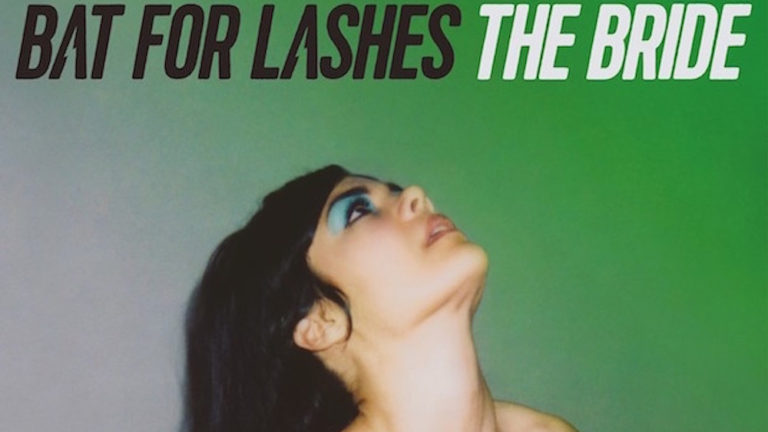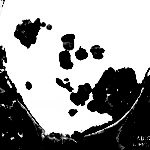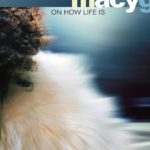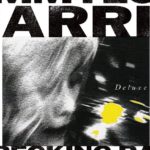Natasha Kahn, known by her stage name, Bat For Lashes, released her fourth studio album “The Bride” on July 1st, 2016. Kahn is also the singer for a collaborative project with the band TOY called Sexwitch, an album including six covers of 70s psychedelic/folk songs from Iran, Morrocco, Thailand, and the US.
I am extremely happy to be reviewing this album because it is the first time that I’m one hundred percent positive that the album is a concept album. I’m still brand new when it comes to listening to concept albums, but I am fascinated with the ones I have heard. Concept albums are what an album should be: a perfectly curated collection of songs that truly move a person if you’re listening to it the right way.
It is so much more than slapping together 20 songs and releasing them under one title. On “The Bride”, Kahn tells the first-person story of a woman about to be married before her fiancé passes away the day of their wedding and the grief/recuperation that comes afterward. I am excited to hear what Bat For Lashes came up with to create the story, but I’m expecting more than cookie-cutter love songs.
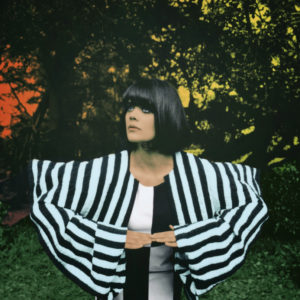
The opening track, “I Do”, is a very blissful introduction to the album. The lyrics are easy enough to understand. A woman is singing about her upcoming wedding and describes how the words “I do” will mean the end of all trouble in her life. The music is like a lullaby, but also is clearly a tune that would be played at a wedding. The song sounds like it would be played during a daydream, which would be calming if I didn’t know how heartbroken this woman was about to be.
The tone of the album changes immediately as the second song, “Joe’s Dream”, starts. The track serves as a warning, either from the singer or from her soon-to-be-husband. As the title suggests, the story turns to one of a “dream of God’s searchlight,” which suggests that the dream was an omen of imminent death. The music itself in this song becomes repetitive but adds a lot to the feeling the listener is supposed to get from the story at this point. It is haunting but it is beautiful.
By the time “In God’s House” starts playing, our bride is waiting for her fiancé at the church for their wedding ceremony. The lyrics are composed of her anxious thoughts and speculations about why he could be running so late, most of which involve his death. This song gets more musically intense than the previous track and continues to get more intense as the bride and listeners realize together that her love has passed.
“Honeymooning Alone” confirms that the worst the bride could have imagined has come true. This song seems to be the beginning of the recurring loneliness theme of the album, as the bride drives away from her wedding towards her honeymoon without a husband. The lyric “I can’t speak because I don’t have you here by my side,” breaks my heart. She doesn’t even know how to feel without her love by her side. The song definitely cues the listener into the singer’s emotions, even though anybody could easily assume what her emotions would be. Her vocals are float-y and hollow, which strengthens the emotion.
“Sunday Love” is the first song on “The Bride” to confuse me. I do not quite know what Kahn is singing about. She is singing about “Sunday love”, but personifies it as a “her.” This personification makes me wonder if Kahn is singing about an actual person, or fantasizing about having the love she had with her deceased fiancé again. The song definitely holds some contradictory resentment in it with the lyrics “Sunday love is so cold” and “I want Sunday love in my heart” juxtaposed together in the chorus. There is a lot that is still open to interpretation, however, and I’m not sure if I have it figured out. Musically, the outro is beautiful. I love the way that the song seems to be letting itself go, which hopefully alludes to our new widow letting go of her pain.
Emotions shift again with “Never Forgive the Angels” to anger. This song is eerie to me because it holds such a calm outrage that I almost missed it completely. The song sounds like one of sadness, until I hear the words “I will never forgive the angels for [my love being gone].” She is no longer dwelling on past events as just things that happened but is now dwelling on them as things that happened directly to her. Her fiancé was taken, he didn’t just die. The music behind her words is soothing and could’ve just as easily been used for a song about having a perfect wedding and happy marriage. If it weren’t for the music and the slight reverb used on Kahn’s voice, I think the song would fall flat.

I had been wondering for the entire album how the relationship between the two lovers had been prior to their wedding. They could have been extremely close or it could have been abusive. “Close Encounters” confirmed to me that their relationship was an amazing one. Kahn sings about how she can still feel her fiancé everywhere that she goes. She feels like she can still communicate with him, and describes it as being able to go over to “the other side” when she needs him with her. It must have been an incredibly harmonious relationship in order for her to feel like her love can still comfort her even though he isn’t physically with her. The song sounds a lot like the previous track did, but doesn’t hold a grudge.
I probably wouldn’t choose to listen to “Widow’s Peak” unless it was in the context of this album and I was listening to the story again. I take this as a success on the artist’s part since it’s such a strong part of this one album that it doesn’t belong anywhere else. The song reminds me of a musical interpretation of a nightmare the bride may have had after her love had died. There is no singing, and there isn’t too much inflection in the tone of her voice while she is speaking. I can’t tell who the widow is talking to exactly, but I could assume that it would be either death, whoever she sees responsible for her love’s death, or her love himself. The song is so unique and curious that listeners have surely come up with numerous interpretations
I had to listen to “Land’s End” a few times before I had a sturdy understanding to write a review about it. The simplest lyrics connected and created the story for me, including “I drove down that old country road” and “for my love I will bleed, gonna drive until I set myself free.” Along with the repetition of the phrase “land’s end” I take this song to mean that the bride is so devastated, angry, depressed and confused that she plans to die in the same way her love did. Some of the string instrumentals sound like something that would be played at a funeral. The song is, again, much calmer than the emotion being portrayed, which makes it so much stronger.

“If I Knew” is a song that I’ve been putting on repeat since I understood it for the first time since because of its relevance to my life right now. The artist finally seems to feel some kind of peace within the situation as she reminisces about the relationship that she had with her love before it ended. She sings about how much he lifted her up, how much he taught her, and how much positive change he put into her life. She thanks him for helping her find herself again.
She says he showed her that the mountain she was trying to climb had a mirror at the top, that all that she had ever been aiming to find could be found inside of her the entire time. She speaks of how she has no regrets and would live it all again if she had the chance. This is the truest love song I have heard in the longest of times, and it is one of my new favorites. I would be lying if I said it hasn’t brought me to tears.
The widow looks back on the journey she’s had since she lost her fiancé in “I Will Love Again”. She acknowledges how she was feeling, but doesn’t feel shameful or embarrassed, which is an important message to send to those listening. The music the music is calming and reassuring, and even though it goes on its own for nearly an entire minute before the lyrics begin, I don’t get bored listening to it.
During the chorus, there is a two-part harmony between the voice we have been hearing for the entire album and what sounds like a male voice. I wonder if this voice is her would-be husband, reminding her that, yes, she will be able to find somebody to love again. The music goes on its own again for over a minute and a half, but I am not bored with it this time either. I think that it symbolizes the time that she is taking/has taken to let everything go.
The last two songs, “In Your Bed” and “Clouds”, confuse me. They seem to be either the widow going back into her depressed state or the widow finding another “true” love but still looking for the love she lost in everything she sees.
I hope that “In Your Bed” is the widow describing how the love she’s found years down the line is just as amazing as the one that she had with her deceased fiancé. This song taking place in the future makes sense with my interpretation of the end of “I Will Love Again,” but I also get the feeling that she could still be singing about the love that she used to have, and is becoming angry again that he isn’t there with her anymore. I was excited for the album to have a somewhat happy ended with her finding a new love, so I’m going to try and convince myself that Kahn was speaking to a new lover, and developing the new dreams spoken of in the lyrics with somebody new.
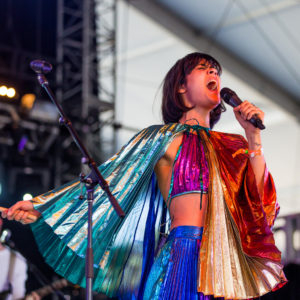
“Clouds”, the final track on “The Bride”, also seems like it takes place years into the future. I was expecting a song about the bride getting to see her husband again in the afterlife because I suppose I’m dramatic like that, but I don’t feel that coming from the lyrics. The only thing I can pick up is that she is waiting for her new love to show up in her life, but that would contradict the previous song where I had interpreted her speaking to her new lover about their relationship. I can’t come up with a conclusion about these last two songs, but it’s possible that they are disconnected from the story. It’s also possible that “The Bride” has an unsatisfactory ending, with the widow never finding a love and always being hooked onto the man that she was supposed to spend her life with.
The songs flow together in the way that any other personal journey flows, slowly and not all at once. The album doesn’t change musical style every time a new track starts, but each song leads the way into the next. Slowly, “The Bride” goes from unaware naivety to haunting recollection to a new hope and finally settles on peace before the listener can even realize that there was a change in tone at all. This album was clearly meticulously planned and written and placed in order for a story to be properly told, and I appreciate it. This album is so different than any other that I’ve heard before, and I will no doubt be listening to it again.
Listen to “The Bride” by Bat For Lashes below or here.

